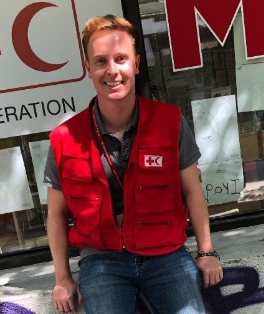September 4, 2019
My experience of multi-purpose cash assistance in Thessaloniki with IFRC
 By Nick Polley, Response Officer, Emergencies team, International Division
By Nick Polley, Response Officer, Emergencies team, International Division
Nick was deployed as a Rotating Cash Delegate
I was recently deployed to northern Greece for 7 weeks where I joined the IFRC team implementing a multi-purpose cash assistance programme covering basic needs. I was based in Thessaloniki and worked to provide cash services to asylum seekers and refugees living in camps and those who were self-accommodated. The programme is very well established having been running since the start of the refugee crisis and my main tasks included enrolling asylum seekers into the programme, carrying out monthly certifications to check people receiving cash were still eligible to do so and trouble-shooting problems like replacing lost or expired ATM cards, unlocking PINs etc. The IFRC runs a Multi-Functional Centre (MFC) in Thessaloniki which offers cash services for people not living in camps as well as providing other services like case-work for vulnerable individuals, Greek language classes, employability skills and other integration services. The amazing staff and volunteers who work there make this centre a really valuable place for people arriving in Thessaloniki.
The majority of my time was spent in one of 16 refugee sites for which the IFRC manages the cash programme. The biggest camps host around 2000 people, but most of the sites are smaller with perhaps 300-400 people. There are also other types of accommodation like hotels or apartment blocks which are smaller still. From my time in Greece I would say people were most commonly from Syria, Iraq and Afghanistan but also many were from West and Central Africa as well as further afield like Bangladesh, Myanmar and even China. The work was similar whether in the MFC or camps, although the camp environment offers particular challenges for residents and the team – for instance some camps are quite remote and can get very hot and humid. From my own interactions with asylum seekers and speaking with others on my team, whilst there are fewer refugees arriving compared to 2014/15, the reasons forcing people to flee are the same then and now. People only leave their homes when the situation is so bad that they must escape, and the threshold for making this decision remains as high as it ever was. The difference now is that there are fewer agencies working in country and less funding available, so the NGOs which remain have to try to plug the gaps. I consequently have a huge appreciation for the work of the cash team there and the role cash assistance can play in providing much needed support to people in a dignified way. Overall, being able to work directly with refugees and understanding the range of difficulties that people in camps face – rather than reading statistics in the news – was a really rewarding experience.
